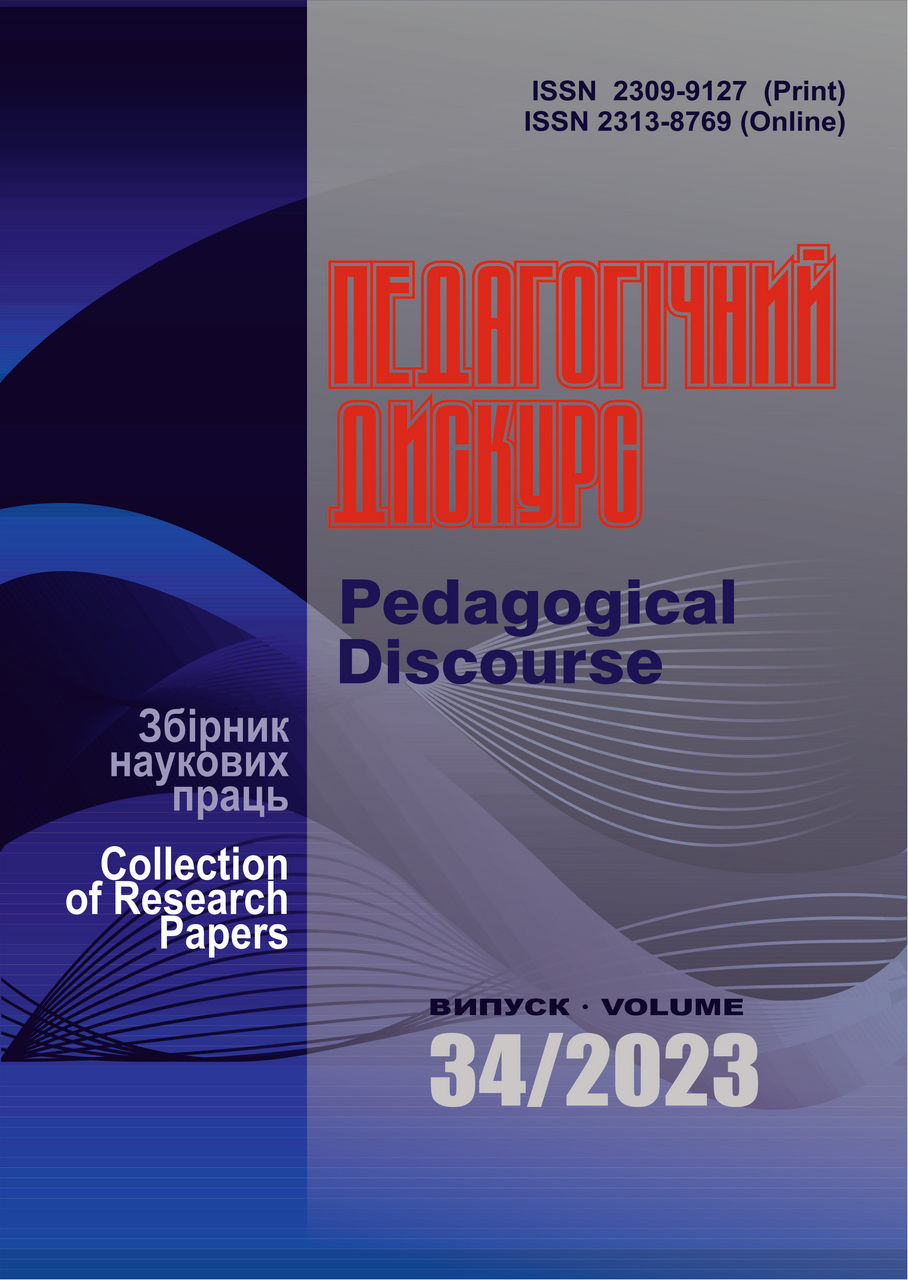I. Yushchuk’s State-Building Views on the Status of the Ukrainian Language
Abstract
The article, based on a theoretical analysis of scientific works and interviews given by I. Yushchuk, highlights the leading pedagogical ideas of the scholar and summarizes his views on the state language. It examines I. Yushchuk’s state-centered perspectives on the importance of the Ukrainian language as the foundation of national identity and statehood. The article identifies the threats faced by the Ukrainian language, including linguistic assimilation and insufficient support from the state and society. It emphasizes that the Ukrainian language must occupy a central place in the educational process and that the role of the educational system in shaping national consciousness and maintaining linguistic culture is critically important.
The aim of the research is to identify the leading pedagogical ideas of I. Yushchuk and summarize his views on the state language through a theoretical analysis of his scientific works and personal interviews. To uncover the subject of the research, a range of general scientific methods was employed, including analysis, synthesis, induction, deduction, systematization, and generalization, as well as specific methods of historical-pedagogical research on the individual, such as bibliographic searches, comparative analysis of scientific sources, including interviews with the studied personality, and biographical methods for elucidating I. Yushchuk’s views on the role of the state language.
The study concludes with the need for a unified language regime in general secondary education institutions. It is noted that students' literacy and overall linguistic culture should be integrated into all aspects of the educational process. This approach will contribute to preserving and strengthening the status of the Ukrainian language, which is not only a means of communication but also a crucial factor in state unity and cultural development.
The article underscores I. Yushchuk’s purposeful use of powerful historical examples and linguistic tools to awaken the national consciousness of Ukrainians, particularly through comparisons with oppressed peoples who dedicate significant efforts to nurturing their linguistic culture. This allowed I. Yushchuk to draw parallels with the situation in Ukraine, where prolonged russification was carried out under the pressure of imperial policy. Attention is drawn to the fact that the absence of a unified language regime may lead to disorganization of linguistic skills among students, negatively affecting both the quality of the educational process and national consciousness. The preservation of linguistic standards is viewed as an integral part of state policy.
In the context of the russian-Ukrainian war, the article emphasizes that the defense of the Ukrainian language is a matter of national survival. russia’s aggressive policy, aimed at erasing Ukrainian identity, is criminal in nature. This highlights the importance of actively defending the Ukrainian language as a cornerstone of national defense and the survival of the nation.
Thus, the article analyzes I. Yushchuk’s state-centered views, which are expressed in his belief in the critical importance of the Ukrainian language for national unity and statehood, as well as the necessity of its active protection and support through the educational system and general language policy. He regarded language not merely as a communication tool but as a crucial aspect of national identity and cultural preservation. I. Yushchuk emphasized the importance of strengthening the status of the Ukrainian language through the educational system and the implementation of a unified language regime in schools, recognizing the role of education in shaping national consciousness. He stressed that the native language must occupy a central place in the educational process, with responsibility resting on all educators, particularly teachers of the native language and literature. His goal was to awaken national consciousness – through vivid historical facts, he stirred in Ukrainians a sense of the value of their native language as part of their freedom and identity, believing that knowledge of the language is not only a right but also a duty that must be defended.
Downloads
References
Антонюк, Н. (2020). Інтерв’ю з Іваном Ющуком: Українська мова скріплює людей та вселяє довіру один до одного. (29 вересня 2020 р.). Взято з: https://uain.press/interview/1346736-1346736 [in Ukrainian].
Артемова, Л. (2006). Історія педагогіки України. Київ: Либідь. [in Ukrainian].
Брояковський, О. В. (2015). Педагогічні погляди та науково-просвітницька діяльність В. Б. Антоновича (1834–1908 рр.). (Дис. канд.пед.наук). Кіровоградський державний педагогічний університет імені Володимира Винниченка. Кіровоград. [in Ukrainian].
Гуйванюк, М. (2021). «На шляху поступу ми лиш каменярі....» Українська літературна інтелігенція в суспільно-політичному та культурно-освітньому житті Галичини й Буковини (кінець XIX – початок XX ст.). (Монографія). Чернівці: Друк Арт. [in Ukrainian].
Задорожна-Княгницька, Л. В. (2020). Історія педагогіки. Херсон: ОЛДІ-ПЛЮС. [in Ukrainian].
Левківський, М., & Пащенко, Д. (2020). Історія педагогіки. Київ: Центр учбової літератури. [in Ukrainian].
Стельмахович, М. Г. (1997). Українська народна педагогіка. Київ: ІЗМН. [in Ukrainian].
Українські педагоги про національно-патріотичне виховання. (2016). Зб. матеріалів Всеукр. наук.-практ. семінару. (Ред.: Л. Березівська, С. Зозуля, Т. Філімонова). Київ: ДНПБ України ім. В. О. Сухомлинського. [in Ukrainian].
Шейко, В. М., & Тишевська, Л. Г. (2006). Історія української культури. Київ: Кондор. [in Ukrainian].
Ющук, І. (2004). Роздум про мету викладання рідної мови в школі. Дивослово, 9, 10–14. [in Ukrainian].
Ющук, І. (2015). Мова – зброя стратегічна. Взято з: https://znannya.org.ua/index.php/novini-znannya/suspilstvo/824-ivan-yushchuk-mova-zbroya-strategichna [in Ukrainian].
Ющук, І. (б.д.). Українська мова – державна. Взято з: https://znannya.info/index.php/novini-znannya/nauka/3784-ivan-yushchuk-profesor-zasluzhenij-diyach-nauki-i-tekhniki-ukrajini-ukrajinska-mova-derzhavna [in Ukrainian].
Ющук, І. П. (2012). Українська мова в школі: методичні поради для вчителя. Тернопіль: Навчальна книга – Богдан. [in Ukrainian].
Ющук, І. П. (б. д.). Формування орфографічної грамотності в учнів. Взято з: https://ushchuk.wordpress.com/wp-content/uploads/2013/09/d0b2d0b8d185d0bed0b2d0b0d0bdd0bdd18f-d0b3d180d0b0d0bcd0bed182d0bdd0bed181d182d196-d0b2-d183d187d0bdd196d0b2.pdf [in Ukrainian].
Яценко, Т. (2016). Тенденції розвитку методики навчання української літератури в загальноосвітніх навчальних закладах (друга половина ХХ – початок ХХІ століття). (Монографія). Київ: Педагогічна думка. [in Ukrainian].
Copyright (c) 2023 Pedagogical Discourse

This work is licensed under a Creative Commons Attribution-NonCommercial-ShareAlike 4.0 International License.

















